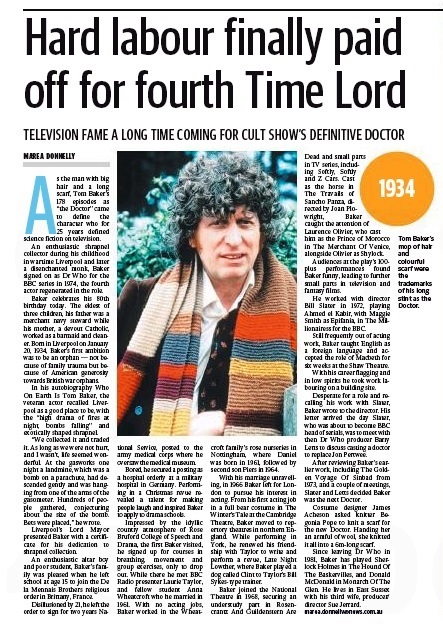Hard labour finally paid off for fourth Time Lord
- Publication: The Daily Telegraph (Australia)
- Date: 2014-01-20
- Author: Marea Donnelly
- Page: 40
- Language: English
Television fame a long time coming for cult show's definitive doctor
As the man with big hair and a long scarf, Tom Baker's 178 episodes as "the Doctor" came to define the character who for 25 years defined science fiction on television. An enthusiastic shrapnel collector during his childhood in wartime Liverpool and later a disenchanted monk, Baker signed on as Dr Who for the BBC series in 1974, the fourth actor regenerated in the role.
Baker celebrates his 80th birthday today. The eldest of three children, his father was a merchant navy steward while his mother, a devout Catholic, worked as a barmaid and cleaner. Born in Liverpool on January 20, 1934, Baker's first ambition was to be an orphan — not because of family trauma but because of American generosity towards British war orphans.
In his autobiography Who On Earth Is Tom Baker, the veteran actor recalled Liverpool as a good place to be, with the "high drama of fires at night, bombs falling" and exotically shaped shrapnel.
"We collected it and traded it. As long as we were not hurt, and I wasn't, life seemed wonderful. At the gasworks one night a landmine, which was a bomb on a parachute, had descended gently and was hanging from one of the arms of the gasometer. Hundreds of people gathered, conjecturing about the size of the bomb. Bets were placed," he wrote.
Liverpool's Lord Mayor presented Baker with a certificate for his dedication to shrapnel collection.
An enthusiastic altar boy and poor student, Baker's family was pleased when he left school at age 15 to join the De la Mennais Brothers religious order in Brittany, France.
Disillusioned by 21, he left the order to sign for two years National Service, posted to the army medical corps where he oversaw the medical museum.
Bored, he secured a posting as a hospital orderly at a military hospital in Germany. Performing in a Christmas revue revealed a talent for making people laugh and inspired Baker to apply to drama schools.
Impressed by the idyllic country atmosphere of Rose Bruford College of Speech and Drama, the first Baker visited, he signed up for courses in breathing, movement and group exercises, only to drop out. While there he met BBC Radio presenter Laurie Taylor, and fellow student Anna Wheatcroft who he married in 1961. With no acting jobs, Baker worked in the Wheatcroft family's rose nurseries in Nottingham, where Daniel was born in 1961, followed by second son Piers in 1964.
With his marriage unravelling, in 1966 Baker left for London to pursue his interest in acting. From his first acting job in a full bear costume in The Winter's Tale at the Cambridge Theatre, Baker moved to repertory theatres in northern England. While performing in York, he renewed his friendship with Taylor to write and perform a revue, Late Night Lowther, where Baker played a dog called Clint to Taylor's Bill Sykes-type trainer.
Baker joined the National Theatre in 1968, securing an understudy part in Rosencrantz And Guildenstern Are Dead and small parts in TV series, including Softly, Softly and Z Cars. Cast as the horse in The Travails of Sancho Panza, directed by Joan Plowright, Baker caught the attention of Laurence Olivier, who cast him as the Prince of Morocco in The Merchant Of Venice, alongside Olivier as Shylock.
Audiences at the play's 100plus performances found Baker funny, leading to further small parts in television and fantasy films.
He worked with director Bill Slater in 1972, playing Ahmed el Kabir, with Maggie Smith as Epifania, in The Millionairess for the BBC.
Still frequently out of acting work, Baker taught English as a foreign language and accepted the role of Macbeth for six weeks at the Shaw Theatre.
With his career flagging and in low spirits he took work labouring on a building site.
Desperate for a role and recalling his work with Slater, Baker wrote to the director. His letter arrived the day Slater, who was about to become BBC head of serials, was to meet with then Dr Who producer Barry Letts to discuss casting a doctor to replace Jon Pertwee.
After reviewing Baker's earlier work, including The Golden Voyage Of Sinbad from 1973, and a couple of meetings, Slater and Letts decided Baker was the next Doctor.
Costume designer James Acheson asked knitter Begonia Pope to knit a scarf for the new Doctor. Handing her an armful of wool, she knitted it all into a 6m-long scarf.
Since leaving Dr Who in 1981, Baker has played Sherlock Holmes in The Hound Of The Baskervilles, and Donald McDonald in Monarch Of The Glen. He lives in East Sussex with his third wife, producer/ director Sue Jerrard.
Disclaimer: These citations are created on-the-fly using primitive parsing techniques. You should double-check all citations. Send feedback to whovian@cuttingsarchive.org
- APA 6th ed.: Donnelly, Marea (2014-01-20). Hard labour finally paid off for fourth Time Lord. The Daily Telegraph (Australia) p. 40.
- MLA 7th ed.: Donnelly, Marea. "Hard labour finally paid off for fourth Time Lord." The Daily Telegraph (Australia) [add city] 2014-01-20, 40. Print.
- Chicago 15th ed.: Donnelly, Marea. "Hard labour finally paid off for fourth Time Lord." The Daily Telegraph (Australia), edition, sec., 2014-01-20
- Turabian: Donnelly, Marea. "Hard labour finally paid off for fourth Time Lord." The Daily Telegraph (Australia), 2014-01-20, section, 40 edition.
- Wikipedia (this article): <ref>{{cite news| title=Hard labour finally paid off for fourth Time Lord | url=http://cuttingsarchive.org/index.php/Hard_labour_finally_paid_off_for_fourth_Time_Lord | work=The Daily Telegraph (Australia) | pages=40 | date=2014-01-20 | via=Doctor Who Cuttings Archive | accessdate=3 February 2026 }}</ref>
- Wikipedia (this page): <ref>{{cite web | title=Hard labour finally paid off for fourth Time Lord | url=http://cuttingsarchive.org/index.php/Hard_labour_finally_paid_off_for_fourth_Time_Lord | work=Doctor Who Cuttings Archive | accessdate=3 February 2026}}</ref>
